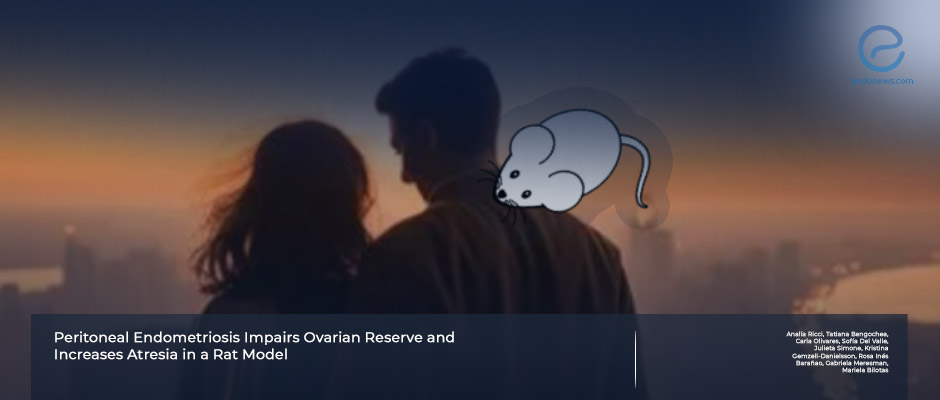Peritoneal Endometriosis Impairs Ovarian Reserve in a Rat Model
May 21, 2025
This study sheds light on the mechanism associated with endometriosis and infertility.
Key Points
Highlights:
- Peritoneal endometriosis significantly impairs ovarian reserve, contributing to infertility by accelerating follicular loss and ovarian aging.
Importance:
- Endometriosis is a major cause of infertility, yet its direct impact on ovarian aging remains poorly understood.
- Clarifying the molecular mechanisms linking endometriosis and ovarian dysfunction could lead to new therapeutic targets to preserve fertility in affected patients.
What’s done here:
- Researchers developed a rat model to evaluate the impact of peritoneal endometriosis on ovarian structure and function.
- Ovarian morphology and molecular markers were assessed through histological analysis and protein expression profiling.
- The study focused on indicators of follicular development, apoptosis, and anti-Müllerian hormone (AMH) expression.
Key results:
- Rats with induced peritoneal endometriosis showed a reduction in total ovarian follicle count, including early-stage follicles.
- 'There was a significant increase in degenerating late-antral follicles and apoptotic corpora lutea, indicating enhanced follicular atresia.
- AMH expression was markedly decreased, reflecting diminished ovarian reserve.
- Expression of pro-apoptotic proteins (BAX) was elevated, while anti-apoptotic markers (BCL-2) were downregulated in the ovaries of the endometriosis group.
From the Editor-in-Chief – EndoNews
"This experimental study provides a valuable contribution to our understanding of how peritoneal endometriosis may compromise ovarian health.
By demonstrating reduced follicle numbers, increased apoptotic activity, and suppressed AMH expression in an animal model, the authors highlight a potential mechanism for endometriosis-associated infertility that goes beyond anatomical distortion or inflammation. The findings are not only biologically plausible but also clinically relevant—pointing toward ovarian aging as a previously underappreciated consequence of peritoneal endometriosis.
A compelling study that warrants further investigation in human tissue and longitudinal cohorts."
Lay Summary
Peritoneal endometriosis significantly decreases the health of the ovaries, found a new study conducted in a rat model. It does so by disrupting the development of ovarian follicles, reducing ovarian reserve, and increasing programmed cell death. In other words, it speeds up the aging of the ovaries, contributing to infertility.
“These results underscore the need for further research to identify the molecular pathways involved and to develop targeted therapeutic strategies,” the authors of the study said.
To better understand the biological mechanism of how endometriosis is associated with infertility, a team of researchers led by Dr. Mariela Bilotas from Instituto de Biología y Medicina Experimental (IBYME), Fundación del Instituto de Biología y Medicina Experimental (FIBYME), Consejo de Investigaciones Científicas y Técnicas (CONICET) in Buenos Aires, Argentina, surgically induced endometriosis in a rat model by transplanting fragments of the uterus onto the animals’ bowel mesothelium.
A month after the operation, they counted the ovarian structures, tested programmed cell death in the follicle and corpora lutea, the hormone-secreting structures that develop in the ovaries after an egg is released, and assessed the expression of proteins associated with programmed cell death in the ovaries.
The results showed that animals in which peritoneal endometriosis was induced had a significant distortion in the structures of the ovaries, i.e., the total number of their follicles was lower. This was the case especially for primordial, primary, preantral, and late-antral follicles. On the contrary, the number of dying late-antral follicles was increased, as was the number of dying cells in corpora lutea, suggesting higher levels of programmed cell death in the ovaries.
In addition, the expression of anti-Mullerian hormone, a marker of ovarian reserve, was reduced in the ovaries in these animals, and at the same time, the expression of proteins associated with programmed cell death was altered.
The study was published in the scientific journal Biomedicines.
Research Source: https://pubmed.ncbi.nlm.nih.gov/40002761
Peritoneal endometriosis infertility ovarian aging reserve

